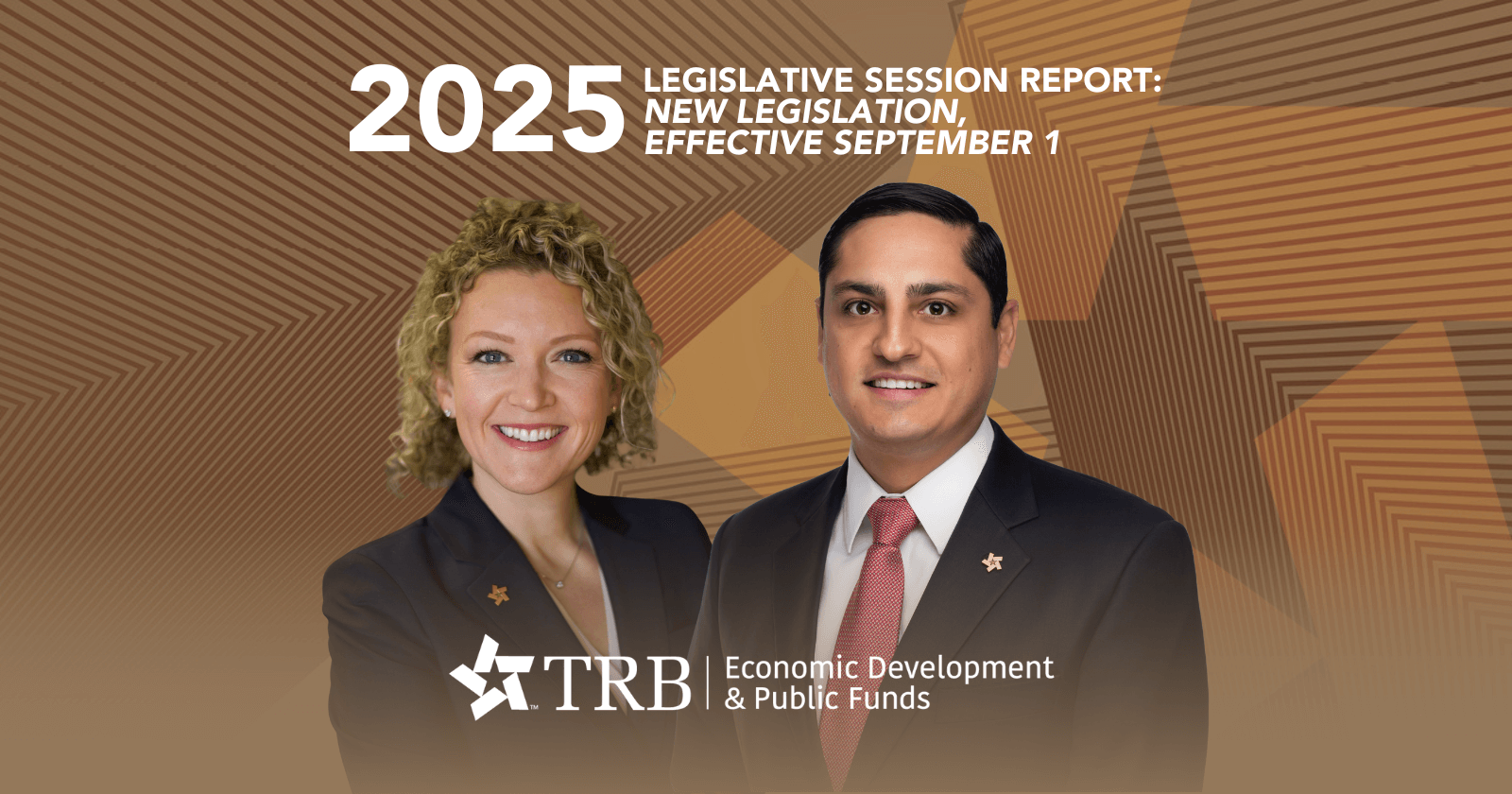By Emily Kirchner, Vice President of Economic Development, and Jesse Ozuna, FVP of Public Affairs
These highlights are excerpted from a larger work by TRB Economic Development and Public Funds. Read our full article here.
Beginning September 1, 2025, new legislation passed during the 89th Texas Legislature is now in effect, shaping financial crime prevention, public school funding, and government operations statewide. The TRB Economic Development & Public Funds team tracked more than 250 bills during the session, working alongside lawmakers and stakeholders to support outcomes that strengthen economic vitality and align with community priorities.
The following measures are but a few of those now in effect that directly impact the people, businesses, and public sector entities we serve.
Legislation Impacting Financial Institutions
HB 201 by Perez: Financial Crimes Intelligence Center
- HIGHLIGHTS: This legislation establishes and enhances the Financial Crimes Intelligence Center’s role in combating card fraud and motor fuel theft in Texas. It outlines the center’s purposes and mandates the center must assist various stakeholders in detecting, responding to, and preventing these crimes. The bill also requires detailed reporting, authorizes grant funding for anti-fraud measures, and sets an effective date for implementation.
- IMPACT: Financial services, retail (especially merchants accepting card payments), and motor fuel sales will be impacted by enhanced protections against fraud and theft. Banks and card issuers will benefit from reduced fraud losses and improved fraud detection support.
HB 272 by Perez: Skimmers on electronic terminals
- HIGHLIGHTS: This legislation allows for the prosecution of fraudulent use or possession of credit card or debit card information in either the county where the offense occurred or the county of residence of the victim. This law also expanded the applicability of certain trial procedures to include offenses related to credit card or debit card information fraud. The bill will apply to criminal proceedings commencing on or after its effective date of September 1, 2025.
- IMPACT: The enhanced legal mechanisms to prosecute fraud may deter criminal activity regarding terminal skimmers. This will benefit banks and credit card companies.
HB 4202 by Swanson: Changes proof of identity measures for Notary Publics
- HIGHLIGHTS: This bill clarifies verification of a signer’s identity and clears up confusion by expanding the definition of a “credible witness” from simply an individual personally known to a notary public to include a person who provided the notary (or other authorized officer) with a current ID card or other federal or state government-issued document that contained the photograph and signature of the witness.
- IMPACT: The expansion of the “credible witness” definition reduces ambiguity for notaries and allows them to utilize witnesses to serve as authorized signers who they might not personally know but who have applicable identification.
Legislation Impacting Education
HB 2 by Buckley: Public Education and Public School Finance
- HIGHLIGHTS: This is the $8.5B comprehensive school finance bill that infused more funds and resources into Texas public schools than ever before. One main component of this appropriation is a $4.2 billion allocation for teacher salary increases: the highest in Texas history. Funding via this bill will provide critical support in teacher compensation, educator preparation, educator rights, special education, early literacy and numeracy, career and technology education, basic allotment automatic increase, and safety funding increases.
- IMPACT: Through this allocation, schools will receive more money to fulfill campus safety requirements, have additional resources to fund full-day pre-K, close the gap of students struggling with reading and math, shift funds for special education to a more equitable approach for the student, and enhance the performance pay system for educators.
Legislation Impacting Government
HB 12 by K. Bell: Review and audit of state agencies subject to sunset review
- HIGHLIGHTS: Multiple state agencies are subject to sunset review each year. HB 12 enhances the sunset review process for state regulatory agencies by requiring greater transparency and public involvement. It mandates that agencies notify stakeholders and the public about upcoming reviews and encourages participation in hearings. It also requires performance evaluations based on measurable outcomes from the past decade to ensure accountability. Some of the more notable agencies subject to this new law are the Department of Agriculture, Department of Banking, Cancer Prevention and Research Institute of Texas, Texas Education Agency, Finance Commission of Texas, Health and Human Services Commission, Department of Licensing and Regulation, Texas Lottery Commission, Texas Department of Transportation, and many others.
- IMPACT: This should lead to more efficient and effective state agency operations, reduce waste, and improve public trust through transparency and accountability. Successful implementation could lead to cost savings and better service delivery across state government.
HB 11 by Phelan: Review and audit of state agencies subject to sunset review
- HIGHLIGHTS: Texas initiated this to maximize occupational licensing reciprocity agreements with other states, ensuring that licensing requirements are substantially equivalent. Reciprocity agreements can lower costs and administrative burdens for individuals and businesses that conduct interstate commerce by avoiding duplicate licensing processes. The Texas Department of Licensing and Regulation is mandated to identify legal barriers to reciprocity and adopt rules for evaluating and entering into such agreements.
- IMPACT: This could lead to increased workforce mobility and reduced licensing barriers, potentially boosting economic activity and employment in regulated professions. However, it may also prompt ongoing adjustments to licensing standards and regulatory oversight.
89th Session at a Glance
The 89th regular session of the Texas Legislature adjourned sine die on June 2, 2025, after 140 days marked by new leadership in the Texas House, procedural changes, and a record-setting workload.
Looking Ahead
Governor Abbott has called two special sessions to consider a number of issues including flood warning systems, disaster recovery funding, property tax relief, education reform, and public safety. The House and Senate have currently adjourned sine die and have addressed some but not all the Governor’s initiatives. There may be additional special sessions called between now and the next regular Legislative Session that will begin in January of 2027.
TRB’s Economic Development & Public Funds team remains actively engaged in discussions with Texas leaders to ensure that the voices of our customers, communities, and public sector partners are represented at the state level.
About TRB Economic Development & Public Funds
TRB Economic Development & Public Funds, a division of TRB, serves as a bridge between the public and private sectors, working with local governments and other entities to align community goals with business priorities. During the 89th session, the team:
- Tracked more than 250 bills tied to banking, economic development, and public policy.
- Provided expert testimony on measures affecting local governments and businesses.
- Met with lawmakers to help ensure legislative outcomes support economic vitality and quality of life across Texas.
This ongoing work reflects TRB’s commitment to supporting the long-term success of Texas communities and the people we serve.



